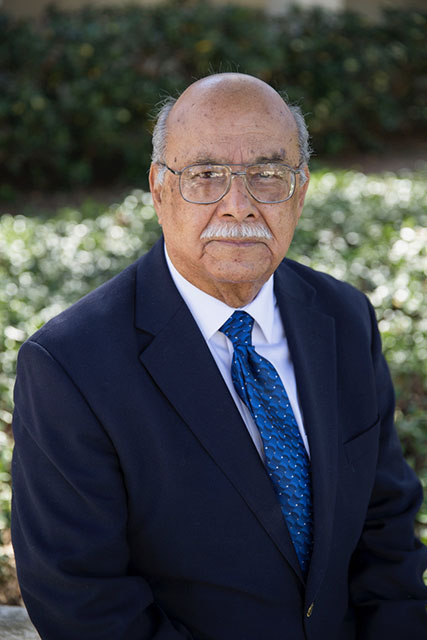 April 25, 2017 — A 60-year veteran of education who has championed the often-neglected population of migrant, homeless, at-risk or foster children will receive an honorary doctorate from CSU Channel Islands (CSUCI) during the May 20 commencement ceremony.
April 25, 2017 — A 60-year veteran of education who has championed the often-neglected population of migrant, homeless, at-risk or foster children will receive an honorary doctorate from CSU Channel Islands (CSUCI) during the May 20 commencement ceremony.
President Erika D. Beck will award Ventura County Office of Education (VCOE) migrant education director Joe Mendoza an honorary Doctor of Humane Letters in recognition of his work as a teacher, administrator, speaker and advocate for thousands of students in need.
“It is my privilege to recognize the extraordinary and transformative efforts of Mr. Mendoza,” Beck said. “He has inspired and motivated thousands of children who are now parents and professionals, many of them educators. In some cases, Mr. Mendoza’s students are now grandparents who are in turn motivating their grandchildren to become educators or invest their time and effort in education.”
Beck added that, because of the programs, policies, and one-on-one work Mendoza has done with these children, they have begun to imagine themselves pursuing a college degree, often at CSUCI.
“Mr. Mendoza is an ardent supporter of higher education, especially within the migrant student population and has concentrated much of his efforts on successful programs at CSUCI,” Beck said.
When he got the news, Mendoza was surprised and humbled.
“I keep thinking there’s a mistake here someplace,” Mendoza said. “I’m overwhelmed, to put it mildly. I can’t believe it.”
Mendoza has helped generations of students in special circumstances through his early work as a teacher, administrator and in his current role as VCOE Director of Special Populations Educational Support Department. Currently, Mendoza works with at-risk, foster, homeless, teen parents, migrant and incarcerated kids, who have a lot in common, he said.
Mendoza also works closely with migrant parents, giving training conferences, seminars, and meetings, in which he shows parents how to help their children succeed in school and go onto college.
“The thing about migrant parents is, as much as they love their children, they are not well informed as to how to help them,” Mendoza said. “Especially girls. In some cases, girls are not expected to attend a university after they reach quinceañera (a girl’s 15th birthday).”
Mendoza encourages parents to become active in their children’s lives at school.
“The groups I work with are in poverty for the most part,” Mendoza said. “Which makes it very hard to look to the future. They don’t see the future or the value of education because they’re so focused on the present, on survival.”
Mendoza knows what it’s like to feel different, even unwelcome in school. Now 84, Mendoza grew up La Colonia and attended a segregated school.
“The playground had a white line in the middle of it and you could only play on one side if you were Mexican and the other side was for ‘Americans,’” he said. “We couldn’t speak Spanish on the playground. The teacher would hear you and here she comes with the paddle.”
By the time boys were 10 or 11, they frequently joined their parents in the field, and Mendoza and his brother were no different. But there was an attendance officer who would search for truant kids working in the fields.
“She would drive an old Model A and she would pick you up if you should have been in school,” Mendoza said. “She’d put you in the car and take you to school.”
Decades after segregated schools, Mendoza has a different take on the concept of diversity.
“Diversity is important, but we need to celebrate what we have in common,” he said. “The strength of this country is not the diversity, but commonality of purpose.”
